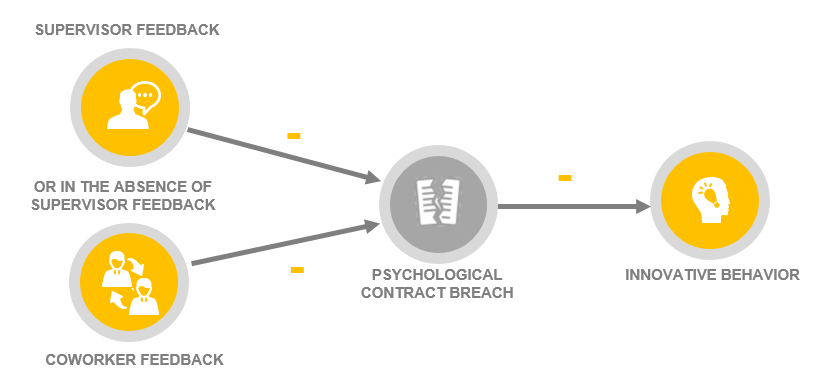Digest 19. Innovation: Don’t discount coworker feedback!
In the fast-paced business environment that we live in today, competition is extremely tied to innovation capabilities. Therefore, innovation behaviors are expected of each and everyone in organizations. Innovation is more than generating novel ideas; it also involves implementing them and, for this reason, employees, their coworkers and supervisors are all called to play a role in the process.
Can feedback be an instrument to increase innovation? This question is all but an obvious one. As in the case of creativity, feedback may exert different effects depending on its sign (positive vs. negative) and the composition of the group (see Digest 18). Moreover, one may think of feedback as a paradoxical injunction with respect to innovation; that is to say, by the very fact of receiving feedback that illuminates the way forward, one would not be able to innovate. Let’s take a look at what scientific research reports on the topic.
How can feedback lead to innovative behavior? Which source of feedback can be effective?
Eva, Meacham, Newman, Schwarz, and Tham (2019) explored the process by which supervisor feedback can impact innovative behavior. They proposed to regard supervisor feedback as a job resource, with the potential to enhance employee work engagement, which is a boost for innovation. Work engagement is a positive state in which a person feels energetic when facing difficult situations (vigor), is totally immersed in her work (absorption), and is profoundly involved in what she does (dedication). Hence, receiving feedback from the supervisor fuels vigor, feeds absorption and supports dedication, ultimately leading to more innovative behaviors. The authors also proposed that not only has the provision of feedback motivational effects; the absence of feedback has the opposite effect: de-motivation. Employees expect to receive feedback from their supervisors in return for their efforts; this is typically comprised in the co-called “psychological contract” – the unwritten set of expectations revolving around one’s employment relationship. When supervisors do not provide feedback, employees perceive it as a psychological contract breach, which has demotivational effects and diminishes innovative behavior.
To test their propositions, Eva and colleagues (2019) conducted a survey study with 300 employees and 64 matched supervisors from two government bureaus in China and found empirical support. An even more revealing finding was that when supervisor feedback was non-existing or insufficient, coworker feedback had a substitutive effect. It could reinforce employee work engagement which enhances their innovative behaviors.
Impact of supervisor and coworker feedback on employee work engagement and innovative behaviors
Also, coworker feedback could lessen the perception of psychological contract breach, which again has positive impact ultimately on innovative behaviors.
Impact of supervisor and coworker feedback on employee psychological contract breach and innovative behaviors
Organizational implications
To promote innovative behaviors in an organization, we offer the following recommendations to HR managers:
Encourage supervisors to provide feedback to their employees to boost their work engagement and diminish their perceptions of psychological contract breach. This will in turn stimulate employee innovative behavior.
Encourage coworkers to provide feedback to one another so as to compensate, in the absence of supervisor feedback, and still generate work engagement and innovative behavior.
Offer training to supervisors as well as coworkers on how to provide constructive feedback (see Digest 3 for tips on constructive feedback).
Offer training to employees on how they can use feedback and be prepared to receive it and make the most out of it (see Digest 5 on the key role of feedback orientation).
——
Reference: Eva, N., Meacham, H., Newman, A., Schwarz, G., & Tham, T. L. (2019). Is coworker feedback more important than supervisor feedback for increasing innovative behavior? Human Resource Management, 58(4), 383–396. https://doi.org/10.1002/hrm.21960


